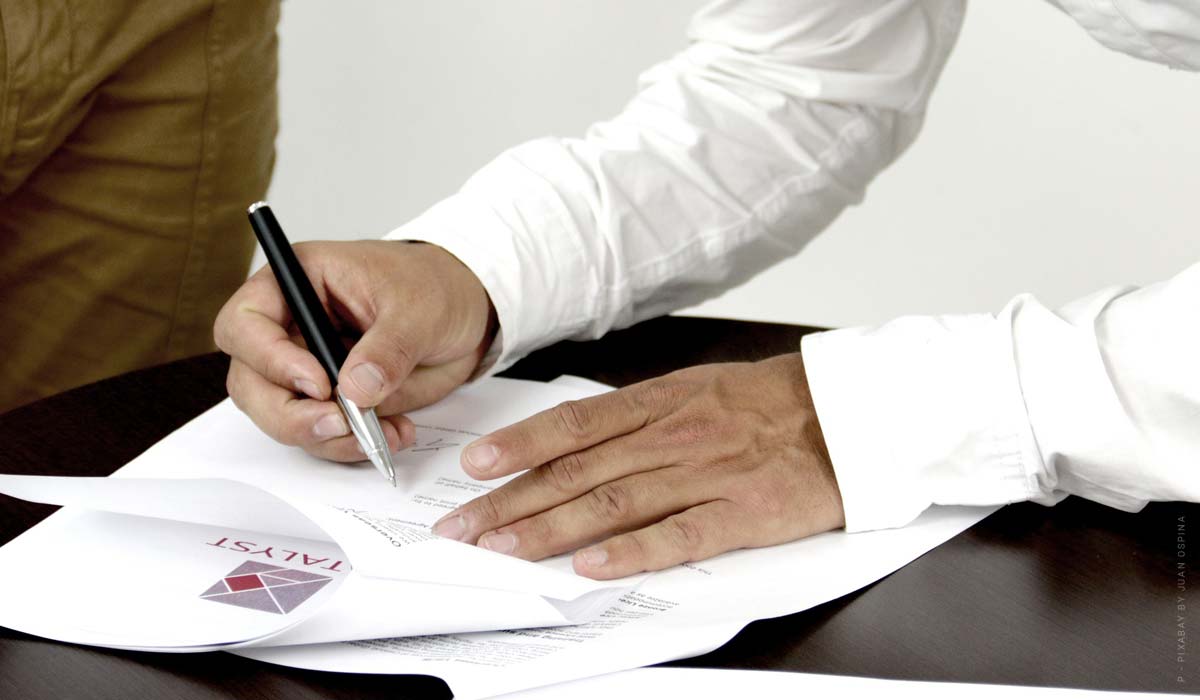Selling a house – the legal basics and pitfalls you should not fall into
Selling a house is a big decision with many legal procedures, contracts and requirements. As a homeowner, you should be well informed in advance about what to expect and what you need to pay attention to, so that you come out of the deal profitable. For the uninformed in the field, there are many legal basics to consider and, above all, small stumbling blocks that should be avoided at all costs.
The notary – legal roles, tasks & necessity in the conclusion of contracts.
Notaries are lawyers who, however, do not support the interests of a party like lawyers do, but act impartially. The focus of their work is to notarize legal transactions, written declarations of intent, such as wills, but also contracts. They are therefore independent and confidential holders of a public office. In special cases, notaries can also hold funds in trust via a ‘notary escrow account’, for example when it comes to paying the purchase price. The notary thus plays an important role in the sale of a house.
The tasks – this role plays the notary in the sale of the house
The tasks of a notary is to regulate the real estate sale as an impartial legal authority in such a way that all parties are satisfied and all possible points of dispute are avoided or settled from beginning to end. The notary draws up a public deed ( the contract of sale ) in which all the necessary legal issues are settled transparently and clearly. Other tasks of the notary are:
The real estate purchase contract must be notarized
In Germany, §311b of the Civil Code (BGB) stipulates that all legal contracts relating to land, assets, estates and real estate are subject to mandatory notarization.
Notaries ensure the protection of buyer and seller
For the legal protection of the buyer, he reserves the property for the buyer in the land register as a priority notice, so that the seller cannot sell the property to someone else at short notice. For the legal protection of the seller, the notary arranges for the final transfer of ownership in the land register as soon as the buyer has actually paid the purchase price.
Notaries ensure immediately enforceable claims
This means that the claims set out in notarized contracts are immediately enforceable. Thus, in order to execute the claims, it is no longer necessary to file an extra complaint with a court, but a bailiff can be commissioned immediately. This takes place, for example, in the event of non-payment of the purchase price.
A notary explains all unresolved legal issues in the sale of real estate
The notary must explain all legal and juridical issues to all contracting parties in such a comprehensive, understandable and sufficient manner that a documentary record of the actual will of both parties is possible. They are obliged to do so by virtue of their public office.
Notaries always cost the same
Costs incurred by the notary are always the same, because the notary fees are regulated uniformly throughout Germany in the Court and Notary Fees Act (GnotKG). Should a notary seek to regulate costs differently, this is ineffective, as this is prohibited by law. This applies to both cost reductions and cost increases.
The purchase contract – legal issues, land register entry, legal protection & checklist
The contract of sale is the legal basis on which a house sale is built. Depending on the case, a purchase agreement always looks different, contains more or less regulations, depending on what the parties have agreed. A contract of sale is a complex and extensive contract, which holds many legal ambiguities and also traps for one or the other. The implementation can also take quite some time. Sometimes up to 8 weeks pass from the signing of the contract at the notary until the transfer of ownership in the land register. This disparity between the transfer of the purchase price, the change of ownership and thus of usufruct and encumbrances, and the ultimate change of ownership and handover raises further legal issues in the sale of a house, which must be regulated in detail in the purchase contract.
Step by step to the purchase contract – What happens when?
The purchase agreement is very complex and is often reviewed and gone through again. All parties should be aware of what the purchase contract contains and what regulations are set out there. Step by step, it is now explained what all there is to consider.
Step 1 – What happens before the purchase contract and what do you need to consider?
If both parties agree, an informal preliminary meeting is arranged with a notary. The notary clarifies formal matters, such as the recording of personal data and the state of affairs, and answers the first legal questions. He also checks the land register entry of the property and starts to draw up a purchase contract. The contract of sale must be sent to both parties at least two weeks before the official date of notarization, so that open questions can be clarified in advance at a possible meeting and everyone agrees with the contract of sale. The notary is obligated to provide legal information about the contract, so don’t be afraid to ask questions.
Step 2 – What happens during the purchase contract and what do you need to pay attention to?
During the notarization of the purchase contract, the notary reads out the purchase contract to both parties. During this time, questions can be asked about each point and the text of the contract can be amended if necessary. When all parties are satisfied with the contract, it is signed and notarized by the notary. By signing the contract, the buyer agrees to pay the full purchase price and can no longer withdraw from the contract after it has been notarized. A financing commitment from the bank should therefore be available in any case before this date.
Step 3 – What happens after the purchase contract and what do you need to pay attention to?
After the appointment with the notary, he is authorized to initiate the next steps on behalf of the parties in order to initiate the execution. First, the notary registers a so-called “Auflassungsvormerkung” in the land register. This is, so to speak, a reservation in the land register and announces the transfer of ownership from seller to buyer. The reservation additionally protects the buyer from selling the property twice. Once this is completed, the notary sends the purchase contract to the tax office. Only after payment of the real estate transfer tax, all costs (notary fees and land registry) and the purchase price, which usually goes directly to the seller’s account, does the notary apply for the transfer of ownership in the land register. Since up to two months can pass between the payment of the purchase price and the registration of the buyer in the land register, the transfer of ownership and keys usually takes place earlier, usually close in time to the payment of the purchase price.
What should a purchase agreement consist of? The checklist for the most important points
- Which object of purchase is sold?
- Who sells to whom?
- What is everything sold with? ( Fitted kitchen, property,… )
- How is it sold?
- How to make the payment? ( Cash, bank transfer, … )
- When is the transfer date?
- What is the breakdown of ancillary and maintenance costs?
- How are the development costs regulated?
- Are there any possible warranty claims?
- What is the condition of the object?
- Does the object have defects?
- Which permits are available and which are missing?
- Allocation of costs
- Authorization of the notary
Check the purchase contract – these are the things you should find in the real estate purchase contract
You will receive the real estate purchase contract at the notary’s office no later than two weeks before the notarization date. Thereupon you should read the contract carefully and clarify all important questions and find certain things in it. First of all you should check if all names, addresses, … are written correctly. You should also find the data on the object of purchase in the purchase contract. This includes an excerpt from the land register, in which the owner, the location, the property description and the building description can be found. In addition, it should be listed exactly what everything is being sold. This includes furnishings, but also floors or awnings. As the next point should be shown, how it is sold. This includes the indication of the selling price, the bank account to which it will be transferred and whether an installment payment or similar has been agreed. The contract should also specify the date of transfer and transfer of ownership, because this will also transfer rights, obligations and costs to the buyer.
Legal protection – what options are there for a purchase contract?
In the case of a purchase contract, there are various ways to legally protect yourself. One of these is the provisional purchase agreement. This is used, for example, if the buyer has not yet fully confirmed the financing or a building permit is missing. A provisional purchase contract is then concluded in which the exceptional cases are regulated in which the buyer could withdraw from the contract. However, it is also possible to claim a so-called right of withdrawal. This is necessary if the buyer does not fulfill his obligations, because then the seller can withdraw from the purchase contract.
Another legal protection option is foreclosure. This ensures that the buyer actually pays, as he submits to a purchase and payment obligation with all his assets. The last legal protection option is contractual penalties. These protect the buyer because if, for example, the seller cannot meet the date of transfer of possession, he will be liable for damages and may have to pay the agreed contractual penalties.











